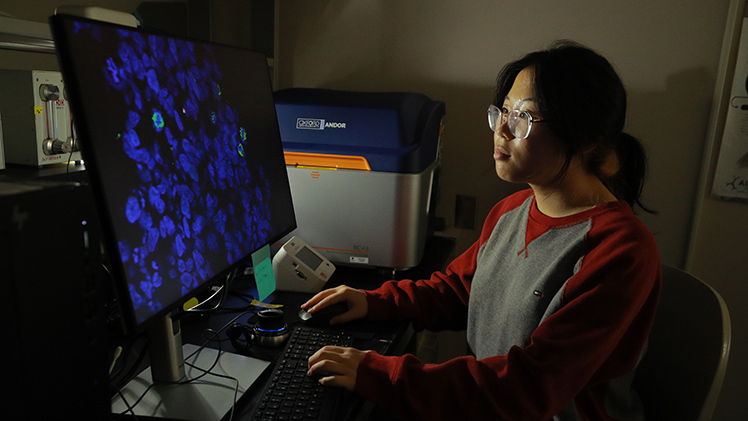Annie Lei has long been fascinated by neuroscience, particularly the way that genetic variants alter brain development and result in medical conditions.
As a high school student in Edison, New Jersey, she took advantage of an opportunity to shadow a doctor who worked with patients with neurodegenerative conditions like dementia, and her current part-time job as a medical scribe puts her in contact with younger patients with neurodevelopmental conditions including autism.

Annie Lei, a neuroscience sophomore, is researching a gene associated with autism spectrum disorders through the First Year Summer Research Experience. Her faculty mentor is Dr. Wei Niu, assistant professor in the Department of Biological Sciences.
The sophomore studying neuroscience hopes to work even more directly with patients like these in the future, crediting her aspirations for a medical career with initially attracting her to The University of Toledo. But as she awaits an interview with the College of Medicine and Life Sciences through UToledo’s early medical school pathway BACC2MD, she’s feeding her fascination with the science of the brain in the research lab of Dr. Wei Niu in the College of Natural Sciences and Mathematics. Niu’s work employing human stem cells and brain organoid models to study genetic variants associated with autism spectrum disorders piqued Lei’s interest almost as soon as she arrived on campus last fall.
Lei is continuing her work this summer through the Office of Undergraduate Research’s First Year Summer Research Experience, which funds students to pursue research and creative projects during the summer following their first year on campus.
“Annie came to my office maybe two, three weeks after classes had started,” recalled Niu, her faculty mentor and an assistant professor in the Department of Biological Sciences within the College of Natural Sciences and Mathematics. “She had one of my research papers in her hand. She had it highlighted, and she started asking questions.
“I’ve mentored a lot of undergraduate students, and I’ve never had one show up with notes,” she continued. “That really speaks to her commitment.”
Lei has been a regular presence in Niu’s lab since that memorable first impression, logging countless hours analyzing confocal images of the highly magnified brain cells they’re investigating for insights into a gene that’s been tied to neurodevelopmental disorders including autism spectrum disorders, intellectual disabilities and epilepsy.
While researchers know that this gene, identified as POGZ, regulates human cortical development, its precise function remains unclear. Niu and her team of undergraduate and graduate researchers are interested in zeroing in on this precise function, and in turn understanding the underlying mechanisms that lead to neurological conditions.
Lei is tackling an element of this work through her summer research project.
“I’m trying to investigate how POGZ regulates cell division during early neurodevelopment by processing and quantifying confocal fluorescent images,” she explained. “It requires a lot of data, so it’s a lot of computer work.”
The First Year Summer Research Experience is one of several programs in the Office of Undergraduate Research. The office also coordinates Undergraduate Summer Research and Creative Activities Program, for example, which is a similar program that is not restricted to first-year students.
Lei is one of 15 students currently participating in the First Year Summer Research Experience, accounting for the largest cohort of students in years, said Chessica Oetjens, program coordinator in the Office of Undergraduate Research.
“They are a very passionate and energetic group,” Oetjens said. “It’s always exciting to watch their research evolve throughout the summer as they grow and learn.”
Neuroscience is a new undergraduate degree program at Toledo, established in response to surging interest in the field of brain research. Lei, who is also pursuing minors in psychology and chemistry, is among the first students to enroll.
The neuroscience undergraduate degree program is a unique collaboration between the College of Natural Sciences and Mathematics, where students begin to build foundational scientific knowledge in their first two years, and the College of Medicine and Life Sciences, where they spend their next two years digging into more advanced subjects like neuropharmacology and medical neuroanatomy.
Lei is looking forward to these future courses on Health Science Campus. She’s had her eye on through the College of Medicine and Life Sciences since she was a student at Woodbridge Academy, a magnet school in her hometown that prioritizes the biological sciences and attracts students like her who are interested in medical careers. UToledo came onto her radar because of its early medical school pathway that allows applicable students an opportunity to sit for the Medical College Admission Test as juniors and apply to the medical college in the summer following their junior year.
After a first year that’s kept her busy with student organizations like the campus chapters of the American Chemical Society and MEDLIFE, as well as the Jesup Scott Honors College, Lei said she’d welcome an acceptance from UToledo.
“That would be great,” she said. “I would love to continue my education here.”